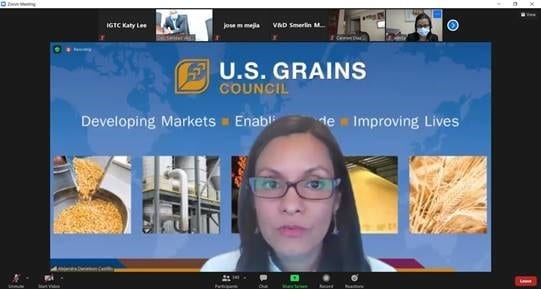While efforts to digitize trade documentation have been underway for some time, delays in shipping and air travel caused by the COVID-19 pandemic have spurred implementation at an accelerated rate. Unfortunately, many initiatives that focused on paperless documentation will end as countries conclude national emergency measures and others were started in a fragmented manner with no globally uniform approach.
The electronic phytosanitary certificate, called the ePhyto Solution, developed by the International Plant Protection Convention (IPPC) Secretariat, aims to address these concerns. The U.S. Grains Council (USGC), as members of the International Grain Trade Coalition (IGTC), was elected to co-chair the Industry Advisory Group (IAG) of the ePhyto Solution Project in 2018 to lead the global conversation about trade and digitalization of phytosanitary measures. Through its involvement with the ePhyto Solution, the Council has been able to highlight the possibilities of facilitating trade within a digitized platform, safely and securely, as well as expand on industry concerns regarding paperless execution.
The IAG is comprised of 12 industry members, provides practical guidance and advice to the IPPC Secretariat on the design, development and deployment of the ePhyto Solution and offers expertise regarding the commercial implications of it.
“The ePhyto Solution is an important part of the drive to streamline border processes, reduce time for cargo clearance and reduce unnecessary cost burdens of trade,” said Alejandra Danielson Castillo, USGC regional director for South Asia. “I encourage all stakeholders to get involved in this project. The greater accessibility to this platform, the greater the benefits that will be realized for global trade.”
Designed to help countries comply with the Trade Facilitation Agreement of the World Trade Organization (WTO), the ePhyto Solution is a three-part electronic certification system that includes:
– a central server (Hub), which facilitates the exchange of ePhytos between national plant protection organizations (NPPOs).
– a Generic ePhyto National System (GeNS), which is a centralized web-based system that allows countries without their own system to produce, send and receive ePhytos through the Hub.
– harmonization, which provides a standardized approach to format, structure and codes, where applicable, in the certificate exchange process.
Global adoption of the ePhyto Solution will facilitate trade especially during critical times such as pandemics. To increase global awareness and increase the conversation between industry and governments, the IAG is hosting ePhyto workshops. To date, South Korea, the Bahamas and the Dominican Republic have been invited to participate, and Costa Rica will be hosting in August.
The purpose of these workshops is to help facilitate conversations between importers, exporters, trade associations and NPPOs on the benefits of adopting the IPPC ePhyto Solution and the eventual use of the Hub or GeNS. With voluntary participation, the workshops allow for a global conversation for the benefit of trade and each have been well received.
More than 350 participants registered for the recent Dominican Republic workshop representing various branches of the Ministry of Agriculture, brokers, importers, exporters, port operators and other plant protection officers.
“In Korea, during the COVID-19 pandemic, due to flight cancellations, there were many cases of delays in customs clearance because the original phytosanitary certificate delivered by express mail was not submitted in time,” said HakSoo Kim, USGC director for South Korea.
“The Korea Animal and Plant Quarantine Agency (APQA) and USDA’s Animal and Plant Health Inspection Service (APHI) agreed to use ePhyto for customs clearance on May 10. The recommendation is to issue ePhyto instead of a paper phytosanitary certificate when exporting DDGS, corn, barley and sorghum. This allows for rapid customs clearance and cost savings as the period for submitting a phytosanitary certificate will be shortened by one to 10 days compared to issuance of paper certificates.”
To learn more about ePhyto, visit the IPPC ePhyto Solution website.
About The U.S. Grains Council
The U.S. Grains Council develops export markets for U.S. barley, corn, sorghum and related products including distiller’s dried grains with solubles (DDGS) and ethanol. With full-time presence in 28 locations, the Council operates programs in more than 50 countries and the European Union. The Council believes exports are vital to global economic development and to U.S. agriculture’s profitability. Detailed information about the Council and its programs is online at www.grains.org.

